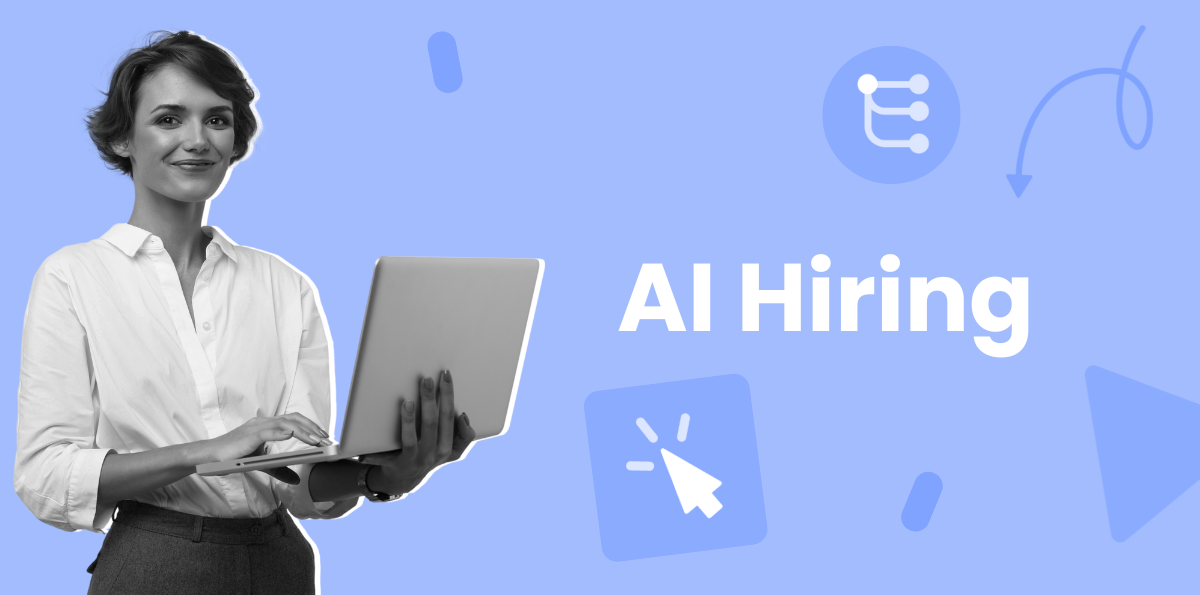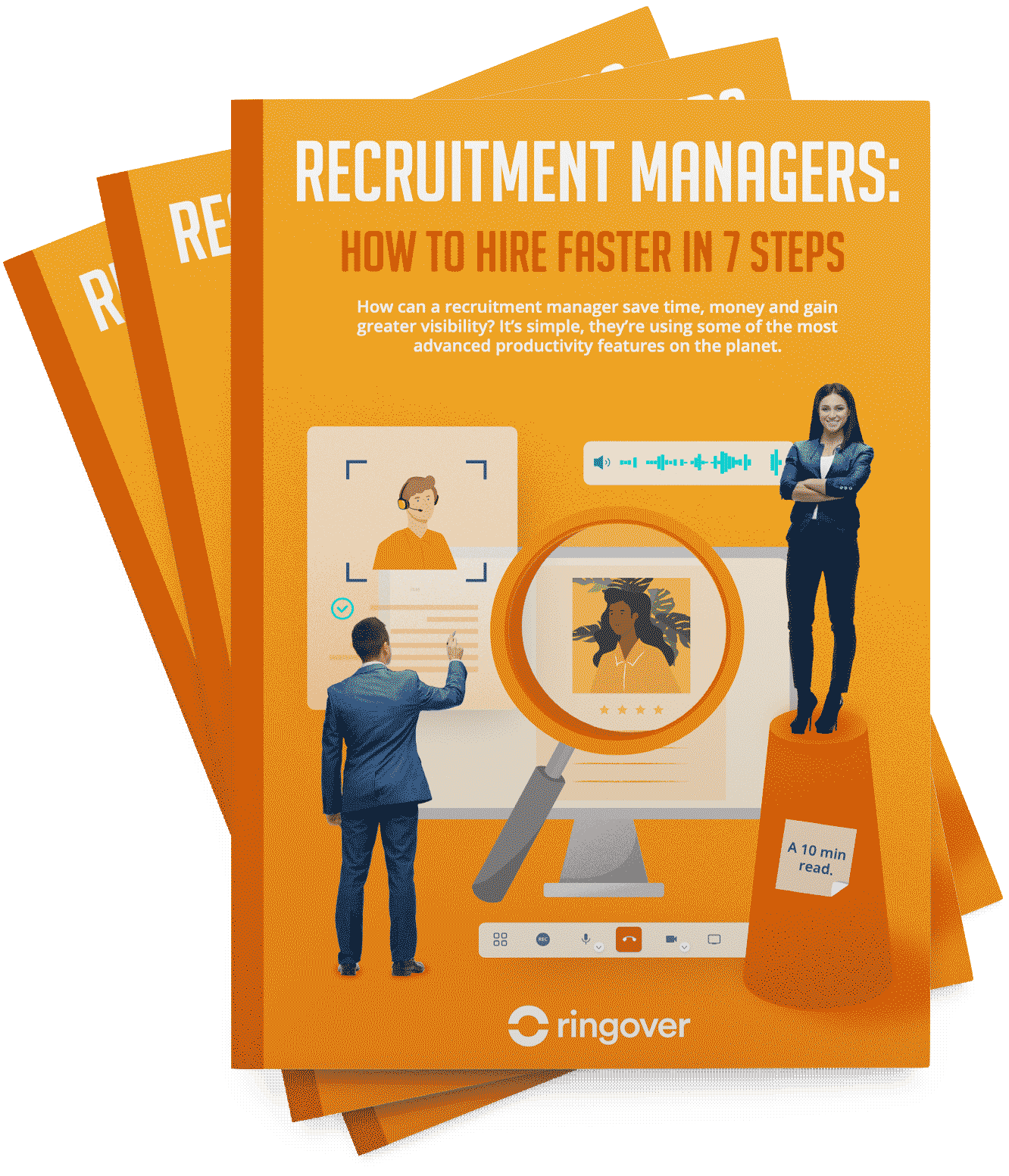Summary
This guide delves into the top 7 AI hiring software set to revolutionize recruitment in 2025. We'll uncover how these tools function, their advantages and potential drawbacks, and address some of the most common queries surrounding AI hiring. Whether you're on the hunt for top-tier talent or searching for your next career move, this article will illuminate how AI hiring can facilitate achieving your objectives.
Table: 7 Top AI Hiring Tools
| Software Name | Description | Best Features |
|---|---|---|
| Empower by Ringover | A cutting-edge AI solution designed for sales and customer service teams, providing conversation intelligence by transcribing, summarizing, and analyzing phone calls to enhance performance and customer satisfaction. | Transcription and summary of calls, detection of discussion topics, performance statistics and recommendations, call library, sentiment analysis, integration capabilities with VoIP phone Ringover |
| Manatal | An innovative AI-powered ATS and CRM system that streamlines the recruitment process for recruiters and hiring teams by providing AI-driven suggestions, enriched candidate profiles, and seamless job board integration. | AI-based recommendations, customizable interface for ease of use, comprehensive job board integration, transparent pricing model, exceptional customer support, adherence to high-security protocols |
| BreezyHR | A holistic recruitment software designed to manage the full hiring cycle from candidate sourcing to onboarding. Its user-friendly tools include a visual hiring pipeline, intuitive drag-and-drop interface, and various automation capabilities. | Visual hiring pipeline, drag-and-drop functionality, automation tools for streamlined processes, efficient candidate management, video interviewing feature, compatibility with multiple platforms |
| JobAdder | A smart recruitment platform that accelerates the hiring process by employing AI to precisely match candidates to job vacancies, and facilitating job postings across more than 200 job boards. | Advanced skill-matching algorithm, extensive reach through 200+ job boards, optimized candidate journey, mobile application for on-the-go access, comprehensive platform integrations |
| Textio | An AI-powered writing tool that enhances job listings, emails, and other recruitment communications. It employs natural language processing and analytics to offer instant feedback and improvement suggestions. | Immediate feedback and recommendations, analytical insights for improved writing, tone and style analysis, diversity and inclusion evaluation, integration with numerous platforms |
| HireVue | An AI-enhanced recruiting aid that optimizes the candidate screening and interviewing phases. It utilizes video interviews, various assessments, and chatbots to provide deep insights and streamline the evaluation process. | Video interview capabilities, comprehensive assessments, chatbot interaction, analytical insights and data, strategies for bias reduction, wide integration with several platforms |
| Turing | An advanced AI-driven platform that connects you with premier remote developers across the globe through a meticulous vetting process and a unique matching algorithm, optimized for finding the perfect fit for your projects. | Thorough vetting procedure, distinctive matching algorithm, remote developer management tools, flexible pricing options, broad integration with various systems |
List: 7 Best AI Hiring Tools
1. Empower by Ringover
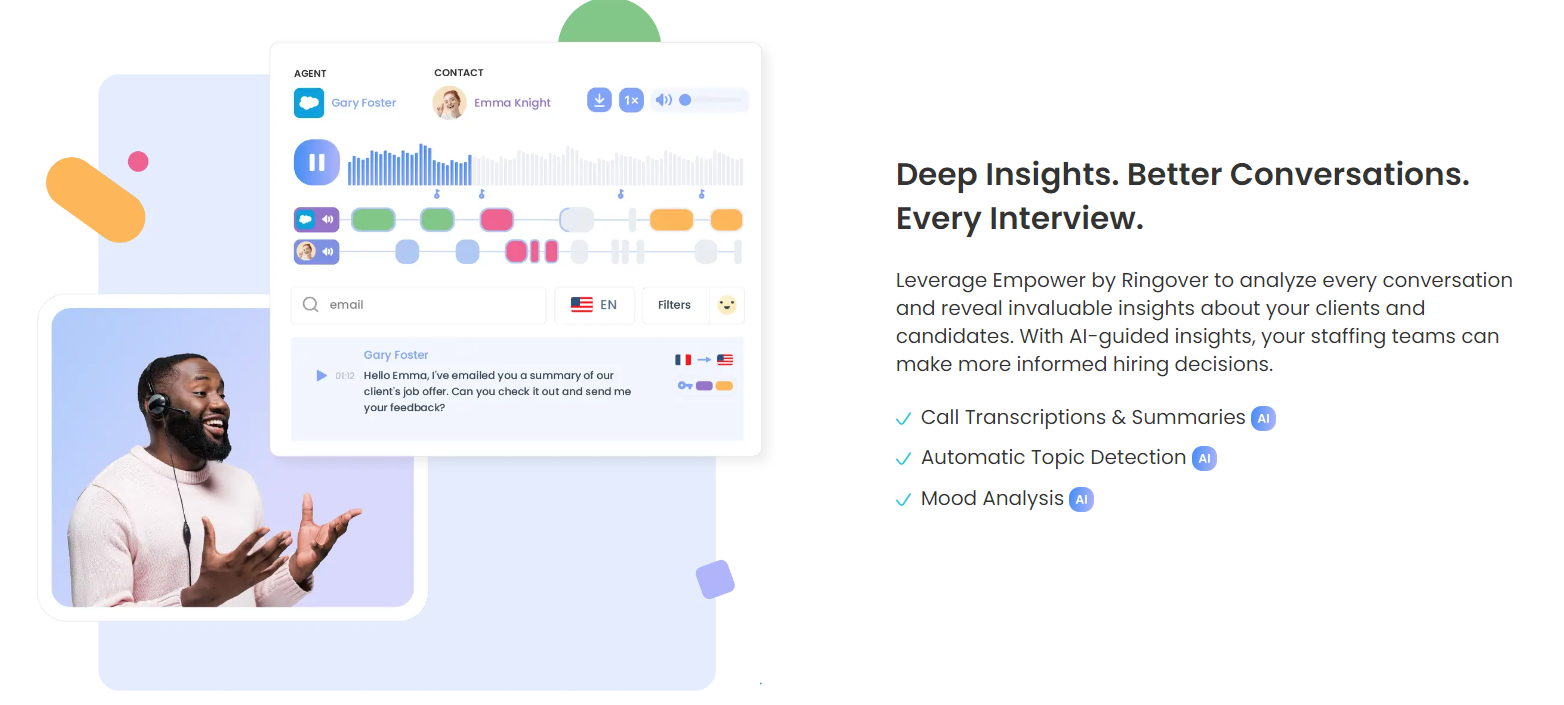
A highly effective conversation intelligence software geared towards optimizing sales outbound call centers and customer service inbound call centers through sentiment analysis. It excels at transcribing, summarizing, and analyzing phone calls to enhance both performance and customer satisfaction.
Empower by Ringover Advantages✅
- Identifies topics, keywords, and sentiments in conversations, aiding in better communication with candidates and customers.
- Delivers actionable analytics and recommendations to boost communication quality and effectiveness.
- Seamlessly integrates with VoIP software Ringover and various business tools like Salesforce, Bullhorn, Hubspot, and more.
Empower by Ringover Disadvantages❌
- Languages limited to English, Spanish, French, Italian.
2. Manatal
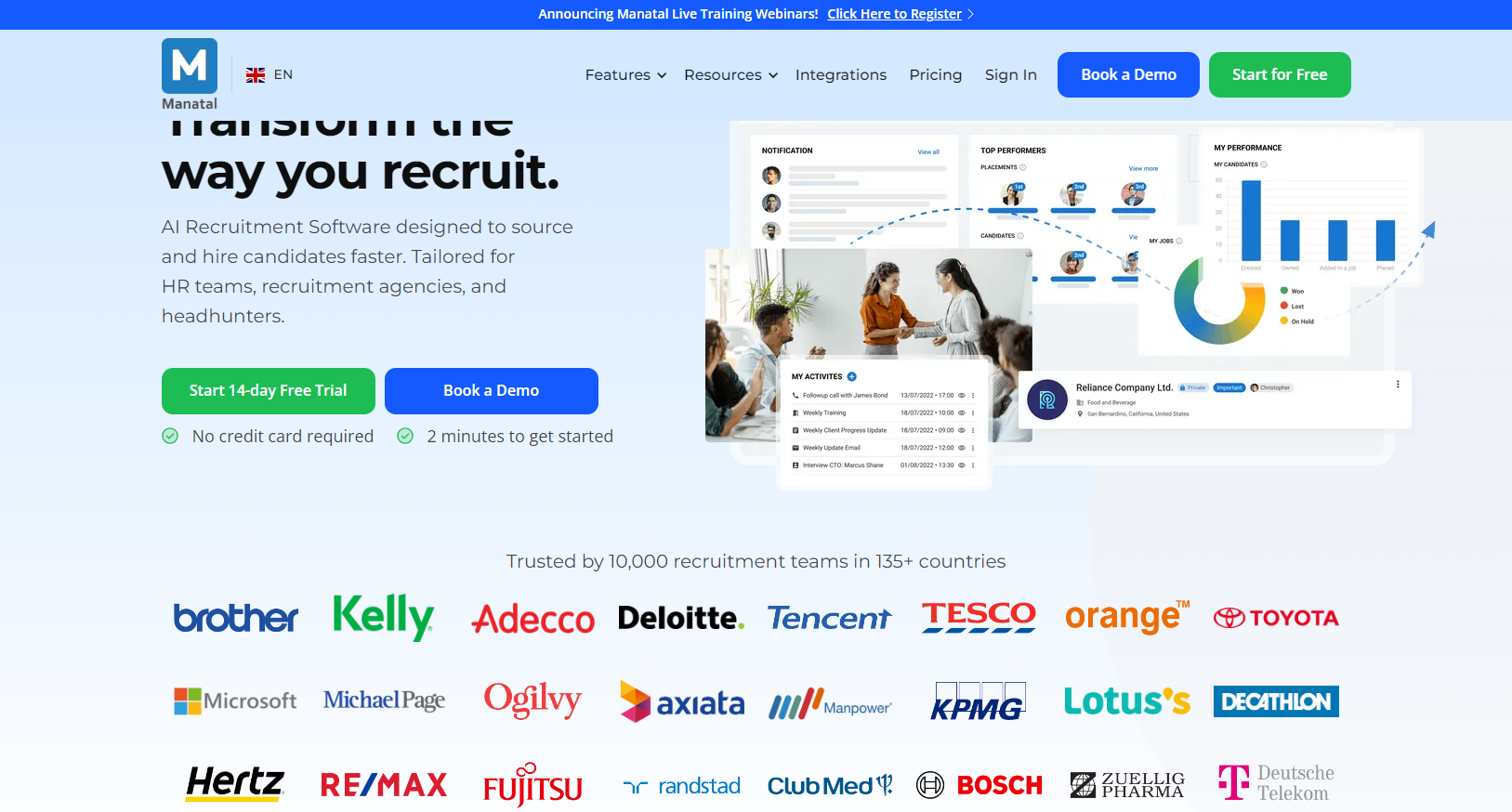
An AI-enhanced ATS and CRM system designed to streamline the recruitment process, making it easier to discover and onboard top talent through AI recommendations, profile enrichment, and integration with job boards.
Manatal Advantages✅
- Access to over 2500 job boards, LinkedIn, social media for social recruiting, and referrals for candidate sourcing.
- Enhances candidate profiles with data from LinkedIn, social platforms, resume parsing, and skill matching.
- Features a customizable interface for managing candidates, clients, and placements, backed by transparent pricing and excellent support.
Manatal Disadvantages❌
- Lacks certain features available in other ATS and CRM systems, like video interviewing and chatbots.
- Possible integration issues with commonly used platforms such as email and SMS.
- May encounter bugs that can impact performance and user experience.
3. BreezyHR
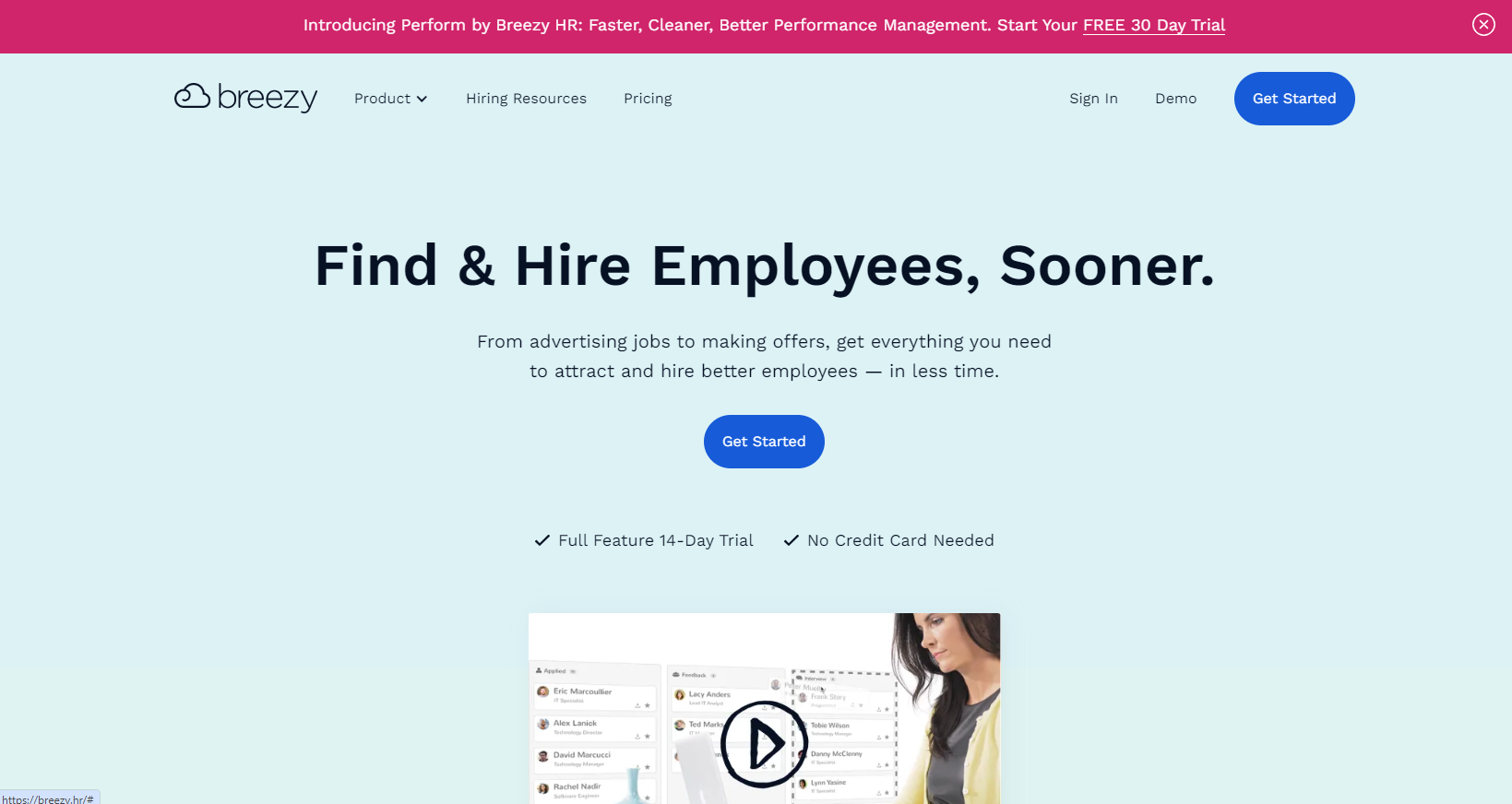
Comprehensive cloud recruitment software that simplifies the hiring process from sourcing to onboarding with its visual pipeline, intuitive drag-and-drop interface, and automation features.
BreezyHR Advantages✅
- Supports job advertising on over 50 job boards and the creation of a branded career site with custom application forms.
- Automates repetitive tasks like candidate pre-screening, email notifications, interview scheduling, and feedback collection.
- Streamlines offer management, background screening, and HRIS software integrations to efficiently convert candidates into employees.
BreezyHR Disadvantages❌
- Limited customization options for certain users in terms of pipeline stages, custom fields, and email templates.
- Reporting and analytics may not be as robust as needed for effective hiring performance and ROI tracking.
- Customer support issues, including slow response times and lack of technical assistance.
4. JobAdder
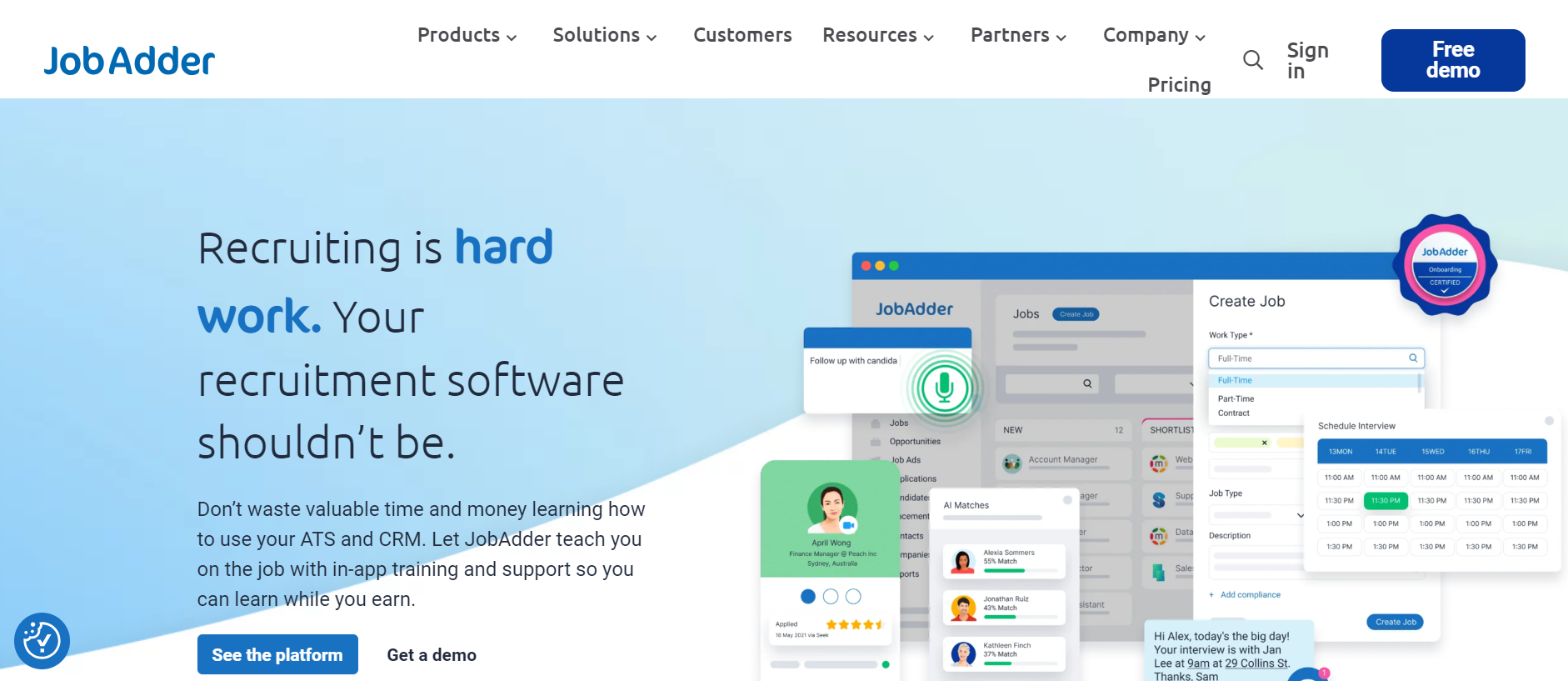
JobAdder is an innovative recruiting automation platform that leverages AI to match candidates to job requirements efficiently and post positions across over 200 job boards.
JobAdder Advantages✅
- Facilitates sourcing candidates from diverse channels including job boards, social media, and talent pools.
- Enhances the candidate experience with a mobile app, chatbot, and feedback mechanisms.
- Features automation, collaboration, and integration tools to streamline recruitment workflows.
5. Textio
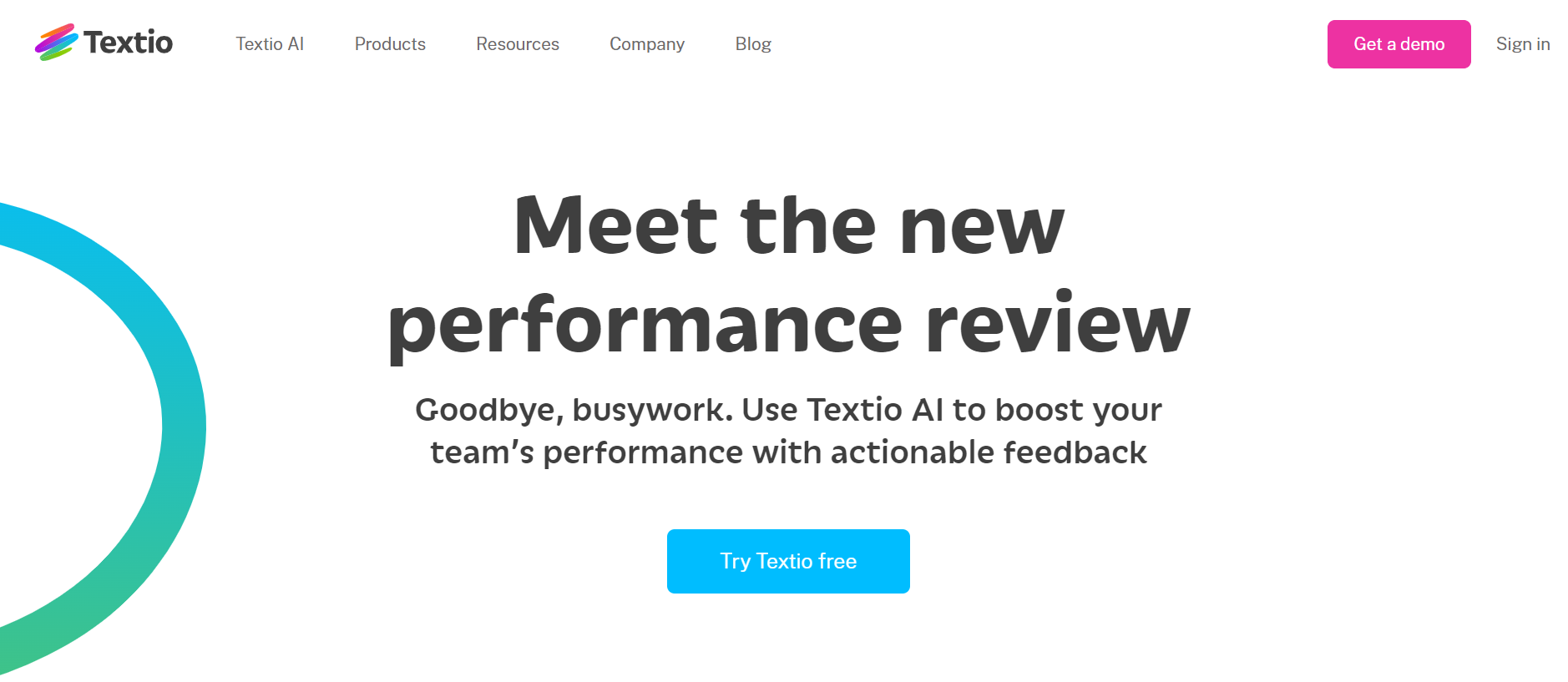
An AI-driven writing assistant that excels at enhancing job descriptions, emails, and other messages through natural language processing and data analytics for real-time feedback and improvement suggestions.
Textio Advantages✅
- Improves writing quality and effectiveness with data insights, tone analysis, and diversity inclusion metrics.
- Boosts candidate attraction with role and location-specific language optimizations.
- Integrates seamlessly with ATS and other platforms like LinkedIn, Gmail, and Slack.
Textio Disadvantages❌
- May not fully grasp the subtleties of brand voice, culture, and values in writing.
- Could struggle with complex, technical writing needs.
- Requires a subscription and a minimum number of users.
6. HireVue
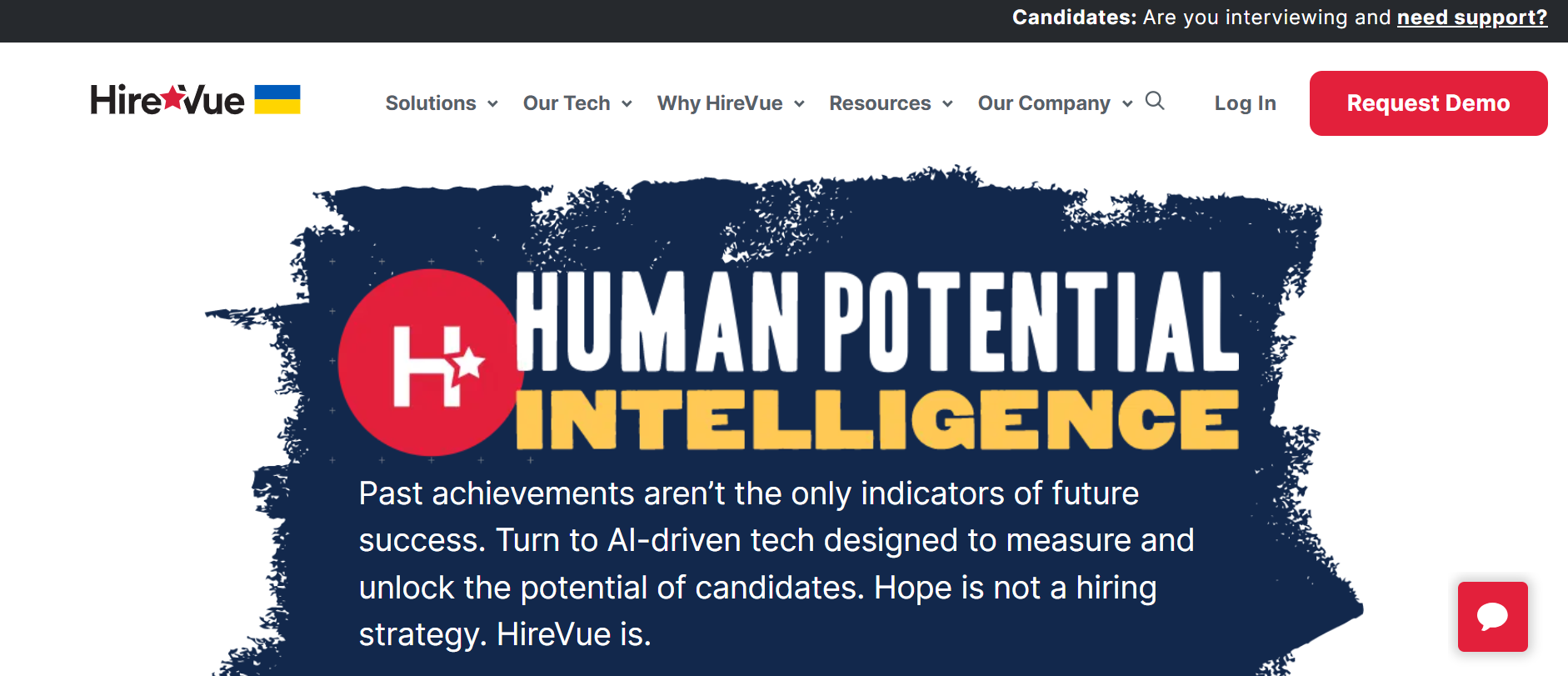
An AI-driven recruitment agency technology that enhances screening and interviewing processes with video interviews, assessments, and chatbots, providing comprehensive candidate insights.
HireVue Advantages✅
- Reduces hiring time and costs by streamlining screening and interviewing tasks.
- Enables assessment of candidates' skills, personality, and potential through structured interviews and analytics.
- Promotes fairness and diversity with standardized hiring criteria and processes.
HireVue Disadvantages❌
- Cannot fully replicate the depth of human interaction and judgment required for certain roles.
- AI algorithms' validity and reliability concerns, especially regarding ethical and legal repercussions.
- Potential compatibility issues with various devices and internet connections that could affect user experience.
7. Turing
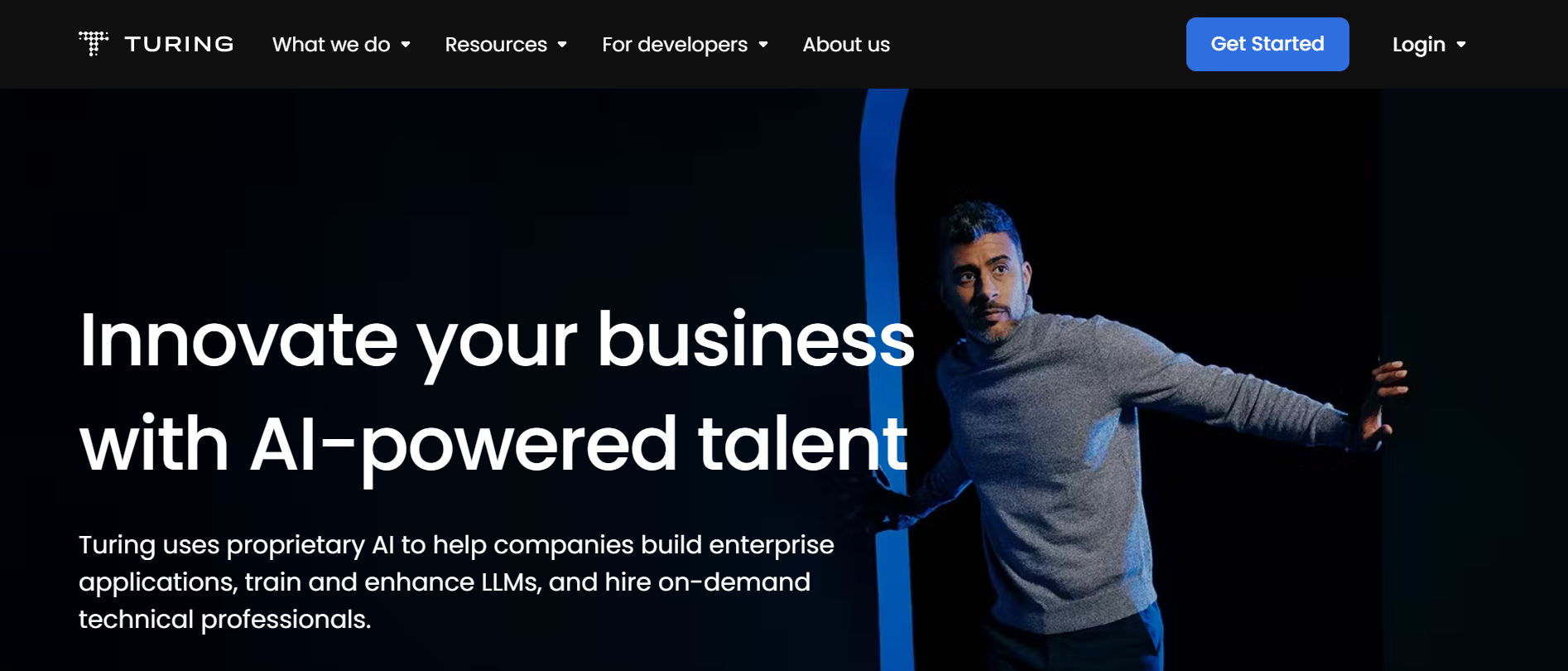
A forward-looking AI talent cloud platform for sourcing and hiring top remote developers worldwide through a rigorous vetting process and matching algorithm.
Turing Advantages✅
- Offers access to a broad, diverse pool of skilled developers ready for remote work.
- Saves time and resources by managing the screening, testing, hiring, payroll, and compliance aspects.
- Equips you with tools for effective communication, collaboration, and performance management of remote developer teams.
Turing Disadvantages❌
- Cannot ensure the constant quality and availability of developers for long-term or complex projects.
- Limited support and guidance for addressing technical or cultural mismatches.
- Intellectual property and confidentiality concerns for sensitive information.
How is AI being used in hiring?
AI in hiring is revolutionizing the way we recruit by utilizing cutting-edge artificial intelligence technologies like machine learning algorithms and natural language processing. This advancement aids in the automation and improvement of the recruitment process, making it possible to source, screen, and evaluate candidates more efficiently and effectively than ever before.
AI's role in hiring is manifested through various features, including the following.
Screening resumes
AI systems can swiftly and accurately sift through resumes, aligning them with job requirements. This not only saves valuable time but also minimizes human errors and biases.
Sourcing candidates
AI can proactively identify potential candidates across multiple platforms - from job boards to social media and referrals - and engage them with bespoke messages.
Automating communication
With AI, communication with candidates becomes seamless through chatbots, emails, or texts, enhancing the overall candidate experience by providing timely information, feedback, and reminders.
Screening candidates for a job
AI is capable of conducting one-way video interviews, as well as various assessments and tests, analyzing candidates' abilities, personality traits, and potential. This enables hiring managers to gain valuable insights and recommendations.
Making informed decisions
By leveraging data and analytics, AI helps measure hiring performance and ROI, offering strategies for further improvement and optimization.
Using AI tools can make a world of difference when it comes to your bottom line! Automatic transcription, sentiment analysis, and more will give your agents more time for what's important, like building relationships with clients and candidates.
Benefits of AI in hiring
Implementing Artificial Intelligence (AI) in hiring processes can significantly benefit both employers and job seekers by enhancing the quality, efficiency, and inclusivity of recruitment. Below are the key advantages of utilizing AI in hiring:
Improved quality of hire ✅
By leveraging data-driven insights, skill-matching technologies, and personality assessments, AI facilitates the recruitment of top-tier talent for open positions. It aids in crafting compelling job descriptions, drawing in more suitable candidates, and offering valuable feedback and recommendations.
Automated time-consuming tasks ✅
AI streamlines recruitment by automating monotonous tasks like resume screening, interview scheduling, and email dispatch. This automation not only saves time and resources but also allows recruiters to concentrate on the strategic and personable elements of hiring.
Better experience for candidates ✅
AI enhances candidate engagement through interactions via chatbots, emails, or texts, equipping them with essential information, feedback, and reminders. It also makes the hiring process more captivating and interactive with tools like video interviews, gamified evaluations, and chatbots.
An optimized recruitment process ✅
Through the use of data analytics, AI optimizes the hiring process by tracking and enhancing hiring performance and ROI. It also assists in pinpointing and rectifying bottlenecks, inefficiencies, and biases, streamlining the recruitment process.
Cost-effective hiring ✅
AI reduces hiring expenses by removing manual tasks such as screening and scheduling, thereby identifying the best candidates more quickly and accurately. Furthermore, it lowers turnover costs by ensuring the new hires are a perfect match for the company's culture and needs.
Reduced time to hire ✅
AI accelerates the sourcing, screening, and interviewing phases, providing insights and suggestions to hasten the hiring process. This efficiency helps secure top talent swiftly, staying ahead of the competition.
No more talent waste ✅
AI maximizes talent utilization by targeting passive candidates, re-engaging prior applicants, and forming talent pools. It also supports talent retention by offering feedback, learning opportunities, and pathways for career growth.
Challenges of AI hiring
Implementing AI in hiring processes brings forth unique challenges and risks for employers and job seekers alike, touching upon ethical, legal, and technical domains. Below, we unravel the primary challenges associated with AI-driven hiring.
Potential bias and discrimination 🔧
While AI holds the promise of diminishing human bias in hiring, it risks embedding or accentuating bias if its underlying data and algorithms lack fairness, transparency, or accountability. Such systems may inadvertently propagate discrimination based on race, gender, age, disability, or other protected classes, whether by design or accident. This not only jeopardizes candidates' rights but also risks employers' reputations and their adherence to legal standards.
Lack of human touch and trust 🔧
AI's capacity to automate and refine the hiring process is undeniable, yet this reduction in human interaction may undercut the essential trust and rapport between candidates and employers. Candidates who value personal engagement or who perceive a threat to their privacy and dignity through AI use may feel alienated or distressed. Employers, too, risk being misled by overreliance on AI without adequate validation of its accuracy and reliability.
Technical limitations and challenges 🔧
AI is touted for enhancing the hiring process's quality and efficiency, but it is not immune to technical impediments that can hamper its effectiveness and user experience. AI systems may malfunction, generate errors, or become targets for cyber attacks. Furthermore, issues with compatibility, interoperability, or scalability may arise when integrating AI across different devices, platforms, or systems.
AI Hiring FAQ
How do I get hired in AI?
Landing a job in AI requires a robust foundation in mathematics, statistics, computer science, or akin disciplines, complemented by proficiency in programming languages like Python, Java, or R. A deep understanding and hands-on experience in machine learning, deep learning, natural language processing, computer vision, or other AI technologies are imperative. Depending on the AI position you're targeting, you might also need expertise in data analysis, cloud computing, software engineering, or business intelligence.
To make your AI skills and portfolio stand out, consider engaging in online courses, pursuing certifications, participating in competitions, or contributing to open source projects.
How much do AI workers get paid?
Compensation can increase by more than $24,000 annually if the candidate has AI skills, according to Ringover's proprietary research on AI's impact on the job market. As per Glassdoor, the average annual base salary for AI professionals in the USA stands at $108,043. This figure can significantly differ amongst various positions.
For instance, AI engineers enjoy an average base salary of $127,986, whereas AI researchers receive about $108,932 on average. Industry-wise, the technology sector offers an average salary of $121,000 to its AI workers, contrasted with $87,000 in the education sector. Location also plays a crucial role; AI workers in San Francisco earn an average of $182,322, compared to $128,917 in Atlanta.
What is the best AI salary?
The highest AI salaries stand between $200,000 to $300,000 per year.
The optimal AI salary is subjective, tailored to your proficiency, experience, expectations, alongside the market demand and living costs. There isn't a universal best AI salary due to the diverse range of roles, industries, and locales, each presenting varied compensation packages and benefits. Yet, to enhance your earning potential in AI, it's advised to continually update your knowledge and skills in this rapidly evolving domain, cultivate a strong portfolio and professional network, and confidently negotiate your salary and benefits.
Are companies using AI to hire?
Indeed, a significant number of companies now employ AI in their hiring protocols, leveraging it to streamline and refine the recruitment process through data, algorithms, and tools for sourcing, screening, and assessing applicants. The advantages of utilizing AI in hiring include the reduction of time and costs associated with recruitment, elevation of hire quality and diversity through unbiased, data-driven selection methods, and the enhancement of candidate experience.
Nevertheless, the application of AI in hiring is not devoid of challenges and risks, such as the potential for data and algorithm-induced bias and discrimination, diminished personal interaction and trust crucial in relationship building with candidates and employers, along with technical hurdles that may impact efficiency and effectiveness. Thus, it's imperative for companies to be cognizant of both the merits and demerits of AI in hiring to ensure its responsible and ethical use.
Published on August 28, 2024.
